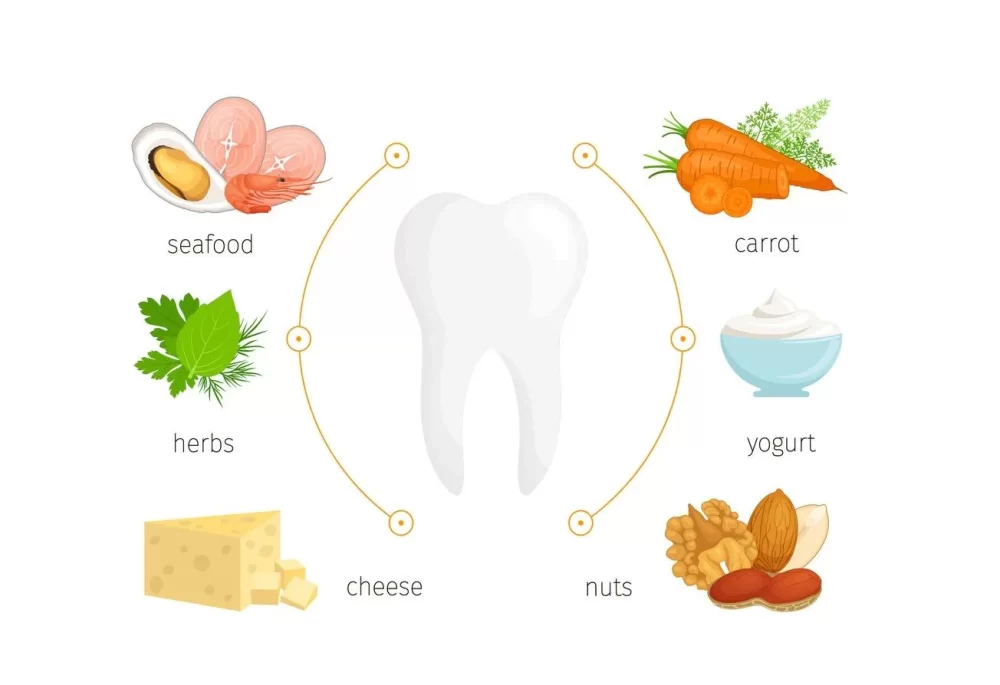
Best Foods for Tooth Enamel Restoration
- 1. Understanding Tooth Enamel and Its Importance
- 2. How Foods Affect Tooth Enamel
- 3. Best Foods for Tooth Enamel Restoration
- 4. Foods to Avoid for Healthy Enamel
- 5. Importance of Dental Care in Enamel Restoration
Maintaining healthy tooth enamel is essential for good oral health, but did you know that certain foods can help restore and strengthen your enamel naturally? As someone who has struggled with enamel erosion in the past, I’ve learned that what you eat plays a significant role in the health and durability of your teeth. Tooth enamel, the hardest substance in your body, is incredibly important for protecting your teeth against decay and sensitivity. In this article, I’ll share how the right foods can help restore enamel or prevent further damage.
Whether you're looking to prevent enamel erosion or improve the condition of your existing enamel, this guide will highlight the best foods for tooth enamel restoration and provide practical tips for maintaining your teeth's health.
1. Understanding Tooth Enamel and Its Importance
Tooth enamel is the thin, outer layer of your teeth that protects them from decay, acids, and everyday wear and tear. While enamel is strong, it is not indestructible. Over time, acids from foods and drinks, as well as physical wear from chewing, can cause enamel to erode. Once enamel is lost, it doesn’t regenerate, which is why it’s essential to protect and strengthen it as much as possible.
As a person who once neglected my enamel care, I learned the hard way that enamel erosion can lead to sensitivity, discoloration, and even cavities. This is why I became dedicated to learning how certain foods can help restore enamel or at least prevent further damage. The good news is that by consuming the right nutrients, we can support enamel remineralization and keep our teeth strong.
2. How Foods Affect Tooth Enamel
The foods you eat play a direct role in the health of your tooth enamel. Some foods are acidic and can erode enamel over time, while others provide essential nutrients that help fortify and restore enamel. It's crucial to understand the relationship between diet and enamel health so you can make informed choices about what you put in your mouth.
Acidic foods and drinks, such as citrus fruits, soda, and wine, can lower the pH in your mouth, which softens enamel and makes it more susceptible to damage. On the other hand, certain vitamins and minerals, especially calcium, phosphate, and vitamin D, help remineralize and restore enamel. In my experience, incorporating enamel-friendly foods into my diet has made a noticeable difference in my oral health.
3. Best Foods for Tooth Enamel Restoration
If you're looking to restore or strengthen your enamel, there are several foods that can help. Here are some of the best foods for tooth enamel restoration, which I’ve personally included in my diet to improve my dental health:
- Dairy Products: Milk, cheese, and yogurt are packed with calcium and phosphate, which are essential for enamel remineralization. Cheese, in particular, has been shown to stimulate saliva production, which helps neutralize acids in the mouth.
- Leafy Greens: Vegetables like spinach and kale are high in calcium, magnesium, and vitamin K, which are vital for strong teeth and enamel protection.
- Apples and Pears: These crunchy fruits help stimulate saliva flow, which is a natural way to protect enamel. They also have a high water content that helps rinse away food particles and acids.
- Nuts and Seeds: Almonds, sesame seeds, and other nuts provide calcium and healthy fats that promote strong teeth and enamel restoration.
- Salmon and Fatty Fish: Rich in vitamin D and omega-3 fatty acids, fatty fish helps the body absorb calcium more effectively and promotes overall oral health.
- Carrots and Celery: These crunchy vegetables help clean teeth naturally and are rich in vitamin A, which is important for the health of your gums and enamel.
By incorporating these foods into your diet, you can support the health and restoration of your tooth enamel. In my experience, eating a balanced diet with these nutrients has helped me maintain strong and healthy teeth.
4. Foods to Avoid for Healthy Enamel
While some foods can help restore enamel, others can contribute to enamel erosion. It’s just as important to know which foods to avoid. Some of the most damaging foods for your enamel include:
- Sugary Snacks: Candy, soda, and other sugary foods provide fuel for harmful bacteria in your mouth that produce acids that attack enamel.
- Acidic Foods: Citrus fruits, tomatoes, and vinegar are acidic and can erode enamel over time if consumed in excess.
- Carbonated Beverages: Both regular and diet sodas are high in acids and can wear down enamel, especially when consumed frequently.
- Sticky Foods: Foods like caramel and toffee stick to your teeth, allowing sugar and acids to linger on your enamel for longer periods.
By limiting these foods and making healthier choices, you can protect your enamel and prevent further damage.
5. Importance of Dental Care in Enamel Restoration
While consuming enamel-friendly foods is important, it’s equally crucial to maintain a good dental care routine. Brushing with a fluoride toothpaste and flossing regularly can help remove plaque buildup, which can contribute to enamel erosion. Regular dental visits are essential for detecting early signs of enamel erosion and getting professional treatments that can help restore enamel strength.
Incorporating both good nutrition and proper dental hygiene has been a game-changer for my enamel health. By making these changes, I’ve been able to prevent further enamel erosion and improve the overall appearance and health of my teeth.
If you want to learn more about how to restore and protect your tooth enamel, or if you're looking for personalized dental care advice, visit [Dentistry Toothtruth](https://familydentistryonline.net). Their team is dedicated to helping you achieve optimal dental health with the right foods, supplements, and professional care.







 BrismanDental4.0 (132 review)
BrismanDental4.0 (132 review) Facer Hales Parker Dentistry4.0 (601 review)
Facer Hales Parker Dentistry4.0 (601 review) Ramsey Family Dental5.0 (93 review)
Ramsey Family Dental5.0 (93 review) Tamaro Frank a DDS0.0 (0 review)
Tamaro Frank a DDS0.0 (0 review) Leesville Dental Studio4.0 (473 review)
Leesville Dental Studio4.0 (473 review) Dental Associates for Kids Only, LLP4.0 (188 review)
Dental Associates for Kids Only, LLP4.0 (188 review) The Importance of Oral Health Education During Pregnancy for a Healthy Pregnancy
The Importance of Oral Health Education During Pregnancy for a Healthy Pregnancy Best Tips for Brushing Your Teeth Properly for Healthy Gums: Essential Techniques for Oral Health
Best Tips for Brushing Your Teeth Properly for Healthy Gums: Essential Techniques for Oral Health Why Skipping Dental Checkups Can Lead to Bigger Oral Health Problems
Why Skipping Dental Checkups Can Lead to Bigger Oral Health Problems Advantages of Porcelain Dental Restorations
Advantages of Porcelain Dental Restorations How Can Diabetes Cause Tooth and Gum Problems? Preventing and Managing Oral Health Issues
How Can Diabetes Cause Tooth and Gum Problems? Preventing and Managing Oral Health Issues Healthy Habits for Promoting Good Oral Health and Hygiene: Tips for a Healthy Smile
Healthy Habits for Promoting Good Oral Health and Hygiene: Tips for a Healthy Smile